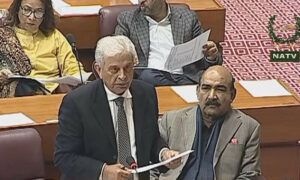Pakistan’s digital rights remain hostage to the same political charades that allowed Peca to flourish in the first place.
Ten years ago, in 2015, the first draft of the Prevention of Electronic Crimes Act (Peca) 2016, surfaced. But not because the government — then too the PML-N — felt the need to be transparent, share and consult. It was a leaked draft that was analysed and shared.
The draft sparked immediate alarm among digital rights activists, prompting a press conference in Islamabad to warn of the bill’s troubling implications. Yet, the mood in the room was sceptical. Reporters questioned the organisers: “How do you know this is the bill? Shouldn’t social media be regulated?”
Incidentally, the very next day, the National Assembly’s standing committee on IT approved a version of the bill similar to the one that had been circulated and spoken about at the press conference.
Over the next year and a half, the bill was vociferously debated both inside and outside the assemblies — not because the government encouraged such discourse, but because an alliance of civil society and industry, supported by allies in the opposition and media, ensured it happened. Despite the resistance, Peca eventually saw the light of day. The Pakistan Peoples Party (PPP) stood as a vocal opponent of the bill, making sure their stance was heard loud and clear. However, the bottom line is that this issue goes beyond mere posturing.
Empty resistance
While several legislators within the party deserve credit for keeping Peca under scrutiny, resisting it in the assembly, and proposing amendments, the momentum faltered when it truly mattered — in the Senate, where the opposition enjoyed a majority. When push came to shove, the resolve wavered.
The bill could have been stalled further, but when it reached the Senate’s standing committee, there was a rush to conclude discussions, with claims that “enough time” had been spent debating and that the bill “needed” to be passed. Despite substantial input and alternative legal formulations provided over the preceding year and a half, claims were made that civil society had failed to contribute anything meaningful or in a timely manner.
PPP legislators patted themselves on the back for a job well done — for proposing over 50 amendments to PECA in the Senate — all of which ultimately amounted to nothing more than cosmetic tweaks of full stops and commas. None of the substantive changes proposed by civil society were ever incorporated.
From the PML-N government, such disregard was expected. However, as the bill approached the finishing line, the PPP and its allies played their optics game, projecting an image of resistance while enabling the ushering in of a law they could have done far more to water down — if not stop altogether.
Illusion of digital rights
Lawmakers often think that passing a law marks the end of their responsibility. They love presenting legislation as a feather in their cap. But proof of the pudding lies in its implementation which they do not care to monitor. This is despite the ample provisions under the legislative scheme, which include standing and special committees, to extend oversight and conduct law reform based on substantive analysis, not knee-jerk reactions and imagined problems.
What amendments since the time Peca was enacted in 2016 have been fielded to roll back its draconian nature? Other than the few times standing committees have taken up one-off issues raised about its implementation, what oversight, scrutiny or accountability has been conducted?
Even now, there are plenty of speeches about slow internet speeds, and standing committees have been addressing related matters such as the Web Management System (WMS) or firewalls. But what has this scrutiny yielded substantively? Has the government or PTA fessed up to the technology that has been deployed? Its capability? Procurement and operation details? Has any legislator so much as inquired about the specifics and followed up?
Parliament’s failure is compounded by that of courts where numerous petitions are pending, challenging the actions of the government and PTA for transgressing their bounds and seeking the protection of fundamental rights, but to no avail.
In this environment, what value, then, does a ‘digital rights’ bill have? The very executive trampling on all things digital has been empowered by this same legislature, including the PPP, through the 26th amendment, which has further weakened the courts. How, then, with a straight face, can the claim of a digital rights bill be made?
Another impending doom
Now, the Prevention of Electronic Crimes Amendment Bill 2025 is staring us in the face.
It creates more offences, limits more categories of speech, enables regulatory capture through a new authority, and adds more red tape with onerous procedures via the creation of tribunals. The bill empowers the hand of the very authorities that continue to hold the internet, services, platforms and citizens hostage.
Only time will tell if these speeches will translate into tangible and substantive resistance — or if they will be opposed and stopped meaningfully, instead of being rubber-stamped as has become the norm in parliament.
As they say, fool me once, shame on you. Fool me twice, shame on me.
There’s no ‘but’ anything this time around. These amendments are not needed and are certainly not being introduced to protect citizens. That fig leaf is long gone. They serve only to maintain the status quo, tightening the stranglehold over speech and information while further subjugating citizens.
- Desk Reporthttps://foresightmags.com/author/admin/










